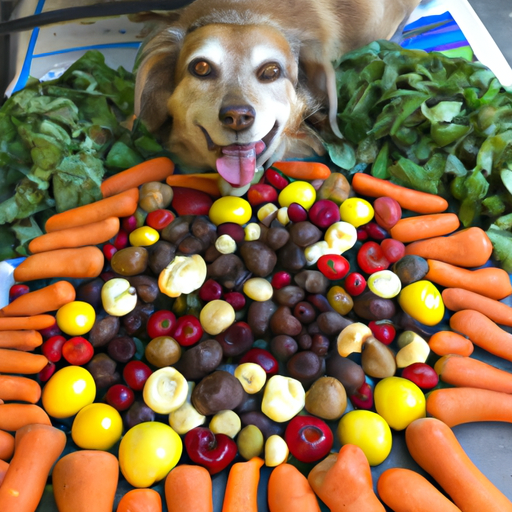As a caregiver for your furry friend, you always want to ensure they get the best nutrition. Vegetables are a great way to supplement your dog’s diet. But which ones are safe and beneficial for your four-legged friend? Let’s dive into this together.
1. Carrots
Carrots are not only a great low-calorie snack that’s perfect for overweight dogs, but they’re also high in fiber and beta carotene, which promotes good eye health.
- Raw or cooked, carrots are a great addition to your pup’s diet.
- Make sure to cut them into bite-sized pieces to avoid choking.
- The crunchiness of raw carrots is also beneficial for your dog’s teeth.
2. Green Beans
Green beans are packed with important vitamins and minerals like iron, calcium, and vitamin K. They’re a good source of fiber and are low in calories.
- They can be served raw, cooked, or even canned, as long as they’re plain with no added salt or seasonings.
- Green beans can be a great treat substitute if you’re trying to help your dog lose weight.
3. Sweet Potatoes
Sweet potatoes are a fantastic source of dietary fiber, vitamin B6, and vitamin C. They also contain the powerful antioxidant beta-carotene.
- They should be cooked before feeding them to your dog to aid with digestion.
- Avoid feeding your dog raw or undercooked sweet potatoes as they could cause blockages in the digestive tract.
4. Pumpkin
Pumpkin is great for your dog’s digestive health due to its high dietary fiber content. It’s also rich in beta-carotene, vitamin A, iron, and potassium.
- It can help with both constipation and diarrhea.
- Be sure to use plain, canned pumpkin and not pumpkin pie mix, which contains sugar and spices.
5. Peas
Peas contain many essential vitamins and minerals like vitamins A, K, and B, along with a high amount of dietary fiber and protein.
- You could use fresh, frozen, or thawed peas – just avoid canned peas due to their high sodium content.
| Vegetable | Benefits | Preparation |
|---|---|---|
| Carrots | Low in calorie, high in fiber and beta carotene | Raw or cooked, cut into bite-sized pieces |
| Green Beans | High in vitamins and minerals, low in calories | Raw, cooked, or canned (plain) |
| Sweet Potatoes | Source of dietary fiber, vitamins B6 and C | Cooked |
| Pumpkin | High dietary fiber, good for digestive health | Canned (plain) |
| Peas | Rich in vitamins, fiber, and protein | Fresh, frozen, or thawed |
Frequently Asked Questions
1. Can all dogs eat vegetables?
Most dogs can eat vegetables, but it’s always best to consult with your vet first, especially if your dog has any health issues.
2. How much vegetables can I give my dog?
Vegetables should make up no more than 10% of your dog’s daily diet.
3. Can I give my dog vegetables every day?
Yes, but in moderation. Too much can lead to stomach upset.
4. Are there any vegetables I should avoid giving my dog?
Yes, onions, garlic, and mushrooms are toxic to dogs and should be avoided.
5. Do I need to cook all vegetables before giving them to my dog?
Not all, but some like sweet potatoes should be cooked to aid with digestion. Always research each vegetable before feeding it to your dog.



